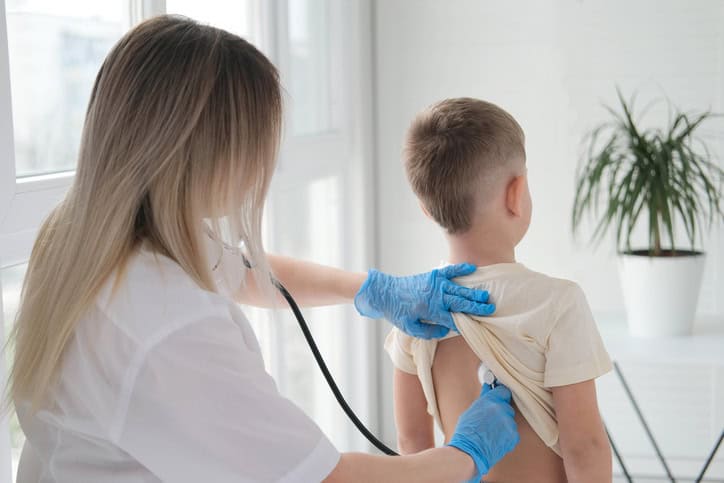The weather is getting colder and your child has had a cough for a week now. Yes, it might be just a cold, but with “walking pneumonia” surging around Chicagoland, Alzein Pediatrics is urging parents and caregivers to understand and recognize the symptoms of this illness, and when to call our office.
Pneumonia is a respiratory tract infection which causes fluid to build up in your child’s lungs, making it difficult to breathe. Different pneumonia strains have different causes. The infections we are currently seeing are caused by the Mycoplasma pneumoniae bacteria. M. pneumoniae causes a mild infection that does not affect your child’s daily activities, commonly called “walking pneumonia.”
Instances of this type of pneumonia have been increasing since the spring in the U.S. across all age groups, but especially among young children. This increase in pediatric cases is of concern, since M. pneumoniae is typically not the cause of pneumonia in children.
It’s difficult to track these infections, because patients may not develop symptoms for up to four weeks after exposure to M. pneumoniae and the bacteria may live in respiratory tracts for months. Exposure to M. pneumoniae bacteria may result in just a chest cold in your child, with a fever, cough and a sore throat, or your child could develop no symptoms at all. However, if the infection progresses, it can develop into pneumonia which can damage the lungs.
Experts believe this rise in M. pneumoniae infections is due to COVID-19 social distancing efforts, as young children were not able to build immunity to common bacteria through normal exposure. Now, children returning indoors to school are more closely exposed to sneezing and coughing which spread the respiratory droplets infected with M. pneumoniae.
Unfortunately, there is no vaccination to protect your child from pneumonia caused by M. pneumoniae. However, getting a flu vaccine, a COVID-19 vaccine and if possible an RSV injection can help protect your child from serious complications if they do contract an M. pneumoniae infection.
You can prevent the spread of this bacteria much like you would other illnesses. Encourage frequent hand washing, especially after using the bathroom, and before and after eating. Give school-aged children alcohol-based hand sanitizer so they can wash hands after recess, gym class and other situations where they come in contact with frequently touched objects and surfaces. In your home, wipe kitchen counters and tables regularly and clean bathrooms often. Isolate anyone in your family who is ill and avoid contact with people who are sick.
Your child may have an M. pneumoniae bacterial infection if they are experiencing:
- Cough
- Fever and chills
- Tired feeling
- Shortness of breath
Watch for symptoms that could indicate your child is developing pneumonia, including:
- Persistent, worsening cough
- Sore throat
- Wheezing
- Fatigue
- Vomiting
When your child has any of these symptoms that are not improving or are worsening, please make an appointment with Alzein Pediatrics.
Because this strain of pneumonia is caused by bacteria, it can be treated with antibiotics, TLC, plenty of fluids and lots of rest.


